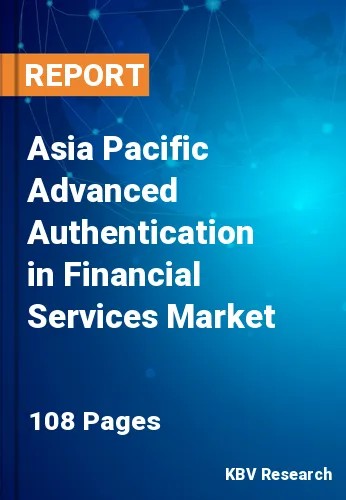The Asia Pacific Advanced Authentication in Financial Services Market would witness market growth of 15.3% CAGR during the forecast period (2022-2028).
One of the most vulnerable areas was banking authentication, with breaches due to inadequate authentication occurring in 90% of smaller institutions. As a result, financial organizations incur significant losses due to authentication security failures. In recent years, many financial establishments have implemented multi-factor authentication (MFA) and two-factor authentication (2FA) to safeguard their brand reputations and continue to comply with federal and state regulations. This has enabled them to confidently safeguard access for their staff and clients.
However, 2FA and simple passwords are no longer sufficient to protect enterprise infrastructure. Passwords are not an effective deterrent for criminals because they are simple to crack and easily foreseeable. While 2FA is an upgrade over password-only authentication and a solid step towards better access and identity management, there are still some 2FA drawbacks. Examples include the ease with which knowledge-based questions can be socially engineered, the vulnerability of hard tokens, the frequent false acceptance of popular push notifications, and the spoofing of one-time passcodes sent by SMS/text.
Asia Pacific occupies a special position in the world's financial and technological environment. It is expanding quickly in several nations in the Asia Pacific region, where the adoption of digital banking and trade is strongest. To establish a "single source of truth" and give banks and retailers verified client digital identities, some nations have established legislation and launched independent programs. As examples, consider Thailand's Digital ID, Singapore's MyInfo, and Malaysia's MyKad, all created to simplify and expedite the identity verification process. Similarly, a major Japanese bank expects facial recognition technology to be installed in all of its ATMs, enabling users to open new accounts. This will fuel market expansion.
The China market dominated the Asia Pacific Advanced Authentication in Financial Services Market by Country in 2021, and would continue to be a dominant market till 2028; thereby, achieving a market value of $942.4 Million by 2028. The Japan market is estimated to grow a CAGR of 14.7% during (2022 - 2028). Additionally, The India market would experience a CAGR of 16.1% during (2022 - 2028).
Based on Type, the market is segmented into Multi-factor Authentication and Single-factor Authentication. Based on Enterprise Size, the market is segmented into Large Enterprises and Small & Medium-sized Enterprises. Based on Authentication Method, the market is segmented into Biometrics, Smart Cards, Mobile Smart Credentials and Others. Based on countries, the market is segmented into China, Japan, India, South Korea, Singapore, Malaysia, and Rest of Asia Pacific.
Free Valuable Insights: The Worldwide Advanced Authentication in Financial Services Market is Projected to reach USD 11.3 Billion by 2028, at a CAGR of 14.5%
The market research report covers the analysis of key stake holders of the market. Key companies profiled in the report include Broadcom, Inc. (CA Technologies, Inc.), Dell Technologies, Inc., Mastercard, Inc., Thales Group S.A., NEC Corporation, ValidSoft Group, SecurEnvoy Limited (Shearwater Group PLC), Ping Identity Holding Corp. (Thoma Bravo, L.P.), Absolute Software Corporation and Fujitsu Limited.
By Type
By Enterprise Size
By Authentication Method
By Country
Our team of dedicated experts can provide you with attractive expansion opportunities for your business.

